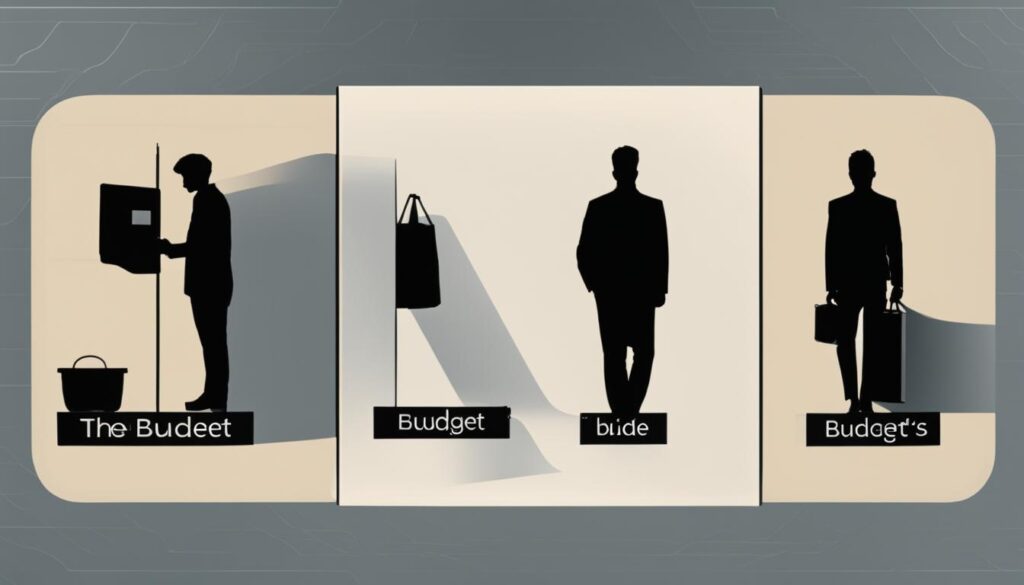The intersection of identity and budgeting is a crucial aspect of personal finance. Your spending habits reflect who you are as a person and play a significant role in shaping your financial destiny. Understanding how your values, beliefs, and self-concept influence your financial decisions is essential for achieving financial well-being.
Key Takeaways:
- Your spending habits reveal insights into your priorities, values, and financial goals.
- Aligning your financial goals with your values and self-identity is crucial for effective budgeting.
- Budgeting can positively impact your sense of self-worth and financial security.
- Integrating identity and budgeting requires conscious effort and strategic approaches.
- By aligning your spending habits with your true self, you can achieve intentional spending and financial well-being.
The Significance of Dollars and Cents
Dollars and cents are not just symbols of monetary value; they hold significant meaning in the realm of personal finance. This term is synonymous with financial, fiscal, and pecuniary matters. Understanding the dollars and cents of your finances is crucial in gaining control over your financial well-being.
In today’s fast-paced world, money plays a central role in our daily lives. It determines the choices we make, the opportunities we pursue, and even our sense of security. Dollars and cents represent the tangible manifestation of our financial resources, encompassing everything from the money in our bank accounts to the coins jingling in our pockets. By grasping the significance of dollars and cents, we can navigate the complex web of financial decisions with greater confidence and clarity.
Furthermore, recognizing the importance of dollars and cents empowers us to make informed choices about our financial future. Whether it’s budgeting, saving, or investing, understanding the monetary aspects of personal finance allows us to take control of our financial destiny. When we truly comprehend the value of our dollars and cents, we can align our financial decisions with our long-term goals and aspirations, ultimately shaping our financial journey.
The Significance of Dollars and Cents
“Money is only a tool. It will take you wherever you wish, but it will not replace you as the driver.” – Ayn Rand
Acknowledging the significance of dollars and cents also extends beyond the practical aspects of personal finance. It has a profound impact on our mindset and relationship with money. By recognizing the true worth of our financial resources, we can develop a healthy relationship with money, one that is grounded in intentionality and responsibility. Our dollars and cents become a reflection of our values, priorities, and aspirations, shaping our identity and impacting our overall well-being.
| Financial Aspect | Meaning |
|---|---|
| Budgeting | Creating a financial plan to allocate dollars and cents effectively |
| Spending Habits | Reflecting values and priorities through the use of dollars and cents |
| Investing | Using dollars and cents as a means to grow wealth and achieve financial goals |
| Saving | Preserving dollars and cents for future needs and aspirations |
The significance of dollars and cents cannot be understated. It encompasses both financial and personal dimensions, influencing our choices, shaping our identity, and paving the way for a secure financial future. By understanding the true worth of our dollars and cents, we can make intentional decisions that align with our values and aspirations.
The Connection Between Identity and Budgeting
Your self-concept, which includes your beliefs, values, and sense of identity, plays a vital role in shaping your budgeting habits. People often develop financial roles based on their self-perception, such as being a saver, a spender, or an investor. These roles can influence your financial decision-making and overall financial health.
The Role of Self-Concept
Your self-concept, the way you see yourself, can greatly impact your budgeting habits and financial choices. If you identify yourself as a frugal individual who values saving and financial security, you are more likely to prioritize budgeting and financial planning. On the other hand, if you view yourself as someone who enjoys indulging in instant gratification, you may struggle with impulsive spending and finding it challenging to stick to a budget.
Understanding the connection between your self-concept and budgeting habits can help you make conscious adjustments to align your financial decisions with your desired self-identity. By identifying the financial roles you tend to adopt, you can assess whether they support your long-term financial goals or hinder your financial progress.
The Influence of Financial Roles
Financial roles, like the spender, saver, or investor, can shape your identity and drive your budgeting behaviors. For example, if you see yourself as a saver, you may prioritize budgeting, setting aside money for savings, and making thoughtful spending decisions. Conversely, if you identify as a spender, you may struggle with saving, finding it challenging to resist impulse purchases and overspending.
Recognizing the influence of these financial roles can empower you to make intentional changes to align your budgeting habits with your financial goals and values. By embracing a role that supports your desired financial outcomes, you can develop a stronger sense of financial control and improve your overall financial well-being.

| Financial Roles | Description |
|---|---|
| Saver | Someone who prioritizes saving money and values financial security. They are likely to create and stick to a budget, set aside money for savings, and make mindful spending decisions. |
| Spender | Someone who enjoys immediate gratification, often indulging in impulse purchases and having difficulty saving money. They may struggle with sticking to a budget and prioritizing long-term financial goals. |
| Investor | Someone who sees the value in investing and seeks opportunities to grow their wealth. They are likely to have a long-term perspective, diversify their investments, and make strategic financial decisions. |
Understanding the connection between your self-concept and financial roles can help you become more aware of your budgeting habits and make intentional changes to support your long-term financial success. By aligning your financial decisions with your desired self-identity, you can create a stronger foundation for financial well-being.
Uncovering Your Spending Habits
Your spending habits reveal a great deal about your financial decisions. By analyzing your spending patterns, you can gain insights into your priorities, values, and financial goals. Understanding your spending habits is the first step towards gaining control over your finances and making smarter financial choices.
One way to uncover your spending habits is to track your expenses diligently. Keep a record of every purchase, whether big or small. This will help you identify patterns and trends in your spending. For example, you may notice that you tend to splurge on dining out or buying clothes impulsively. By recognizing these habits, you can begin to make conscious decisions to change them.
Another method is to categorize your expenses. Create different categories such as groceries, utilities, entertainment, etc. and allocate your spending accordingly. This will give you a clear picture of where your money is going and whether it aligns with your financial goals. You may be surprised to discover how much you’re spending on certain categories and find opportunities to cut back and save.
Tracking and analyzing your spending habits empowers you to take control of your finances and make informed decisions. Here are a few steps to get started:
- Review your bank statements and credit card bills to identify all your expenses.
- Create a spreadsheet or use a budgeting app to categorize your expenses.
- Analyze your spending patterns and identify areas where you can make adjustments.
- Set realistic financial goals based on your spending habits and budget accordingly.
- Regularly review and revise your budget to stay on track and continue improving your financial well-being.
Remember, uncovering your spending habits is a journey towards financial freedom. It may take time and effort, but the rewards will be worth it. By understanding your spending patterns, you can take control of your finances, make intentional choices, and work towards achieving your financial goals.

Budgeting for Your Identity
When it comes to budgeting, it’s easy to get caught up in numbers and financial goals, but it’s equally important to consider how your budget aligns with your values and self-identity. Your budget should reflect who you are and what you value most in life. By incorporating your identity into your budgeting process, you can ensure that your spending decisions are in line with your long-term financial objectives.
One way to budget for your identity is to prioritize your financial goals based on what truly matters to you. Consider what brings you fulfillment and purpose, and allocate your resources accordingly. For example, if travel is a core part of your identity, you might choose to allocate a larger portion of your budget towards saving for trips and exploring new destinations.
Another important aspect of budgeting for your identity is to align your spending with your values. Take a moment to reflect on what you truly value in life. Is it experiences, relationships, or personal growth? Once you have a clear understanding of your values, you can make intentional decisions about how you allocate your money. For example, if you value sustainability, you might prioritize spending on eco-friendly products or supporting businesses that align with your values.
| Financial Goals | Values |
|---|---|
| Save for a down payment on a house | Stability, security |
| Create an emergency fund | Peace of mind, preparedness |
| Invest in self-development | Personal growth, lifelong learning |
| Donate to charitable causes | Compassion, social responsibility |
Remember, budgeting is not just about crunching numbers. It’s about aligning your financial decisions with your values, goals, and self-identity. By budgeting for your identity, you can live a more intentional and fulfilling financial life.
Aligning Your Budget with Your Self-Identity
One way to ensure that your budget reflects your self-identity is to track your spending and evaluate whether it aligns with who you are. Regularly review your expenses and ask yourself if they truly reflect your values and priorities. If you find that certain spending habits do not align with your self-identity, make adjustments and reallocate your resources accordingly.
Another strategy is to set aside a portion of your budget for discretionary spending that is specifically dedicated to activities or purchases that align with your self-identity. This allows you to indulge in the things that bring you joy and fulfillment without feeling guilty or compromising your financial goals. By making room for self-expression within your budget, you can enhance your overall sense of well-being and satisfaction.
In conclusion, budgeting for your identity involves more than just numbers; it’s about crafting a financial plan that aligns with your values, goals, and self-identity. By considering what truly matters to you and making intentional decisions about how you allocate your resources, you can create a budget that reflects who you are and helps you live a financially fulfilling life.
The Impact of Budgeting on Identity
Budgeting is more than just managing your finances; it has a profound impact on your identity and self-perception. The financial habits you develop through budgeting shape your mindset and determine how you view yourself in relation to money. By adopting positive financial habits and a mindset focused on long-term goals, you can enhance your sense of self-worth, financial security, and overall well-being.
When you prioritize budgeting, you are showing yourself that you value financial responsibility and discipline. This mindset cultivates a sense of control over your financial life, empowering you to make thoughtful financial decisions. By tracking your spending, setting financial goals, and making intentional choices about how you allocate your money, you are actively shaping your identity as a person who is in charge of their financial future.
“Budgeting is not restricting yourself; it’s empowering yourself to make choices that align with your values and long-term aspirations.” – Financial Expert
Additionally, budgeting can influence how you perceive yourself and how others perceive you. As you develop healthy financial habits, you may find that your self-perception improves. You may see yourself as more responsible, disciplined, and in control of your financial destiny. This positive self-perception can boost your confidence and lead to a stronger overall sense of self.
In summary, budgeting goes beyond the practical aspects of managing your money. It has a significant impact on your identity and self-perception. By adopting positive financial habits, you can enhance your mindset and develop a strong sense of control over your financial life. Budgeting is a powerful tool that not only shapes your financial future but also shapes who you are as a person.

Strategies for Integrating Identity and Budgeting
Integrating your identity and budgeting requires a thoughtful and deliberate approach. By aligning your financial values with your budgeting decisions, you can create a financial plan that truly reflects who you are. Here are some strategies to help you seamlessly integrate your identity and budgeting:
1. Identify Your Financial Values
“Your values are like a compass. They give direction to your financial decisions and guide you towards a financially fulfilling life.” – Financial Expert
Start by identifying your core financial values. What matters most to you when it comes to your money? Is it security, freedom, or impact? Take the time to reflect on what truly matters to you and let these values shape your budgeting decisions.
2. Track Your Expenses
Tracking your expenses is a crucial step in integrating identity and budgeting. It allows you to see where your money is going and whether it aligns with your financial values. Use budgeting tools or apps to track your spending and categorize it according to your values. This will enable you to make adjustments and ensure that your spending is in line with your identity.
3. Set Realistic Financial Goals
Setting realistic financial goals that reflect your identity is essential for successful integration. Consider your long-term aspirations and break them down into achievable milestones. Whether it’s saving for a dream vacation, starting a business, or paying off debt, align your goals with your values and commit to taking the necessary steps to achieve them.
By integrating your identity and budgeting, you can create a financial plan that not only helps you achieve your goals but also aligns with who you are as a person. Remember, your financial well-being is not just about the numbers; it’s about living a life that reflects your values and aspirations.
Conclusion
Understanding the relationship between identity and budgeting is crucial for achieving financial well-being. Your financial destiny is intertwined with your sense of self, and your spending habits reflect who you truly are. By consciously aligning your spending with your values and self-identity, you can take control of your financial future.
Intentional spending is a key component of financial success. When you prioritize your values and make thoughtful decisions about where your money goes, you create a sense of purpose and fulfillment in your financial life. By aligning your dollars and cents with your true self, you can experience greater satisfaction and peace of mind.
To achieve this, it’s important to set realistic financial goals that reflect your identity. By identifying your financial values and tracking your expenses, you can ensure that your spending aligns with your long-term objectives. Make adjustments as needed to stay on track and maintain your financial well-being.
Remember, your identity and budgeting are intertwined. Take the time to evaluate your spending habits and make intentional choices that align with who you are. By doing so, you can create a harmonious relationship between your values and your financial decisions, leading to a more fulfilling and prosperous life.
FAQ
How do your spending habits reflect your financial destiny?
Your spending habits reveal insights into your priorities, values, and financial goals. By analyzing your spending patterns, you can gain control over your finances and make smarter financial choices.
How does budgeting align with your values and self-identity?
Budgeting is not just about tracking expenses; it involves aligning your financial goals with your values and self-identity. By creating a budget that reflects who you are and what you value, you can ensure that your spending aligns with your long-term financial objectives.
How does budgeting impact your sense of self-worth and financial security?
Budgeting shapes your identity by instilling discipline, responsibility, and a sense of control over your financial life. By adopting positive financial habits and a mindset focused on long-term goals, you can enhance your sense of self-worth and financial security.
How can you integrate your identity and budgeting?
Start by identifying your financial values and aligning them with your budgeting decisions. Track your expenses to ensure they align with your goals and values. Set realistic financial goals that reflect your identity and make adjustments as needed to stay on track.
Why is understanding the relationship between identity and budgeting important?
Understanding the relationship between identity and budgeting is essential for achieving financial well-being. By consciously aligning your spending habits with your values and self-identity, you can gain control over your financial destiny and live a life of intentional spending.


Pingback: Fear Factor: How Fear Influences Your Budget – Straight Fire Money